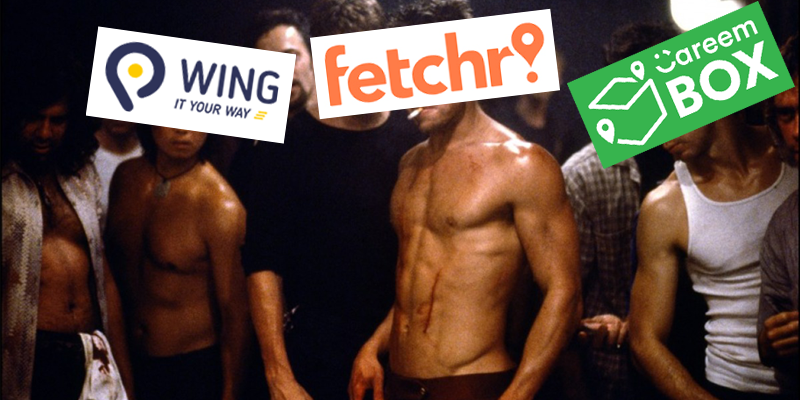Competition in the “last mile logistics” space has heated up in recent weeks. The following UAE-based startups are either dedicated to, or active in this space:
Fetchr has just closed its (long and drawn out) Series B securing $41mn of dry powder. Wing was seeded by Souq.com back in the summer of 2016. With Amazon now owning Souq.com we don’t think funding is in short supply there. The newest last-mile entrant Careem closed its Series D round at the start of this year, which saw them draw $350mn from investors, new and existing.
Each of the business models somewhat differ. Wing has taken an aggregation approach owning no vehicles themselves. Careem is similar, however Fetchr has opted for a more capitally demanding approach; owning and employing their own vehicles and drivers.
Business models aside, there are two general schools of thought on the impact of competition over the next few years.
Thought 1
When two players dominate a market there’s obviously competition but also scope for cooperative dynamics. With just two players, it’s easier to establish coordination and stay out of each other’s sub-segments. With three or more well-funded players in a market (we’re not evening counting Aramex, FedEx and DHL), things are arguably harder to manage with civility, leading to a higher likelihood of customer segment overlap and confrontation. A greater probability of cut-throat behavior, including price wars, emerges.
Thought 2
The counter argument is that early competition makes startups stronger. HBR did a study in the UK on this and claim empirical evidence to support the thesis.
We found that companies launched in crowded markets had higher odds than others of failing in the first year—but if a company survived during this early period, it had a much greater chance of making it to the three-year mark. A firm’s early exposure to competition appears to have an immunizing effect, in much the same way that a person’s exposure to illness can create antibodies that provide long-term protection.
Either way, the above thoughts are not mutually exclusive, but their interplay willl be interesting to observe. We believe that The Fight for The Last Mile will indeed get ugly and there will be plenty to learn from. Regardless of the outcome, the consumer is sure to win.
Competing Horses
A subtle development we’ve picked up on after the Fetchr round was that of Middle East VCs backing competing startups. Fetchr’s Series B round counts BECO Capital as an investor. BECO is also an investor in several of Careem’s rounds, including its last, the Series D. We ask ourselves:
- Are VCs doing the right thing for their LPs by investing in competing businesses?
- Are VCs constrained by the number of “invesitble” companies?
- Are Middle East startups being dealt a poor card by the limited number of professional VCs able to invest in them? Given their need for capital, they end up accepting investment from less than ideal, or conflicted sources.
Firms in Silicon Valley have different opinions on the matter. Some thought leaders such as Spark and AVC feel strongly against overlapping investments.
Consider a simple scenario. What happens if a VC fund holds positions in two competing businesses and one of those businesses makes a mistake that the VC learns about. Repeating our previous question (see our post on Mohammed AlAbbar’s conflicts), can a startup be sure their VC doesn’t advise a competing startup not to make that same mistake? The competing startup thereby saves money and time and so marginally increases its odds versus the rival.
We don’t presume the Careem/Fetchr scenario was planned. We wouldn’t be surprised if BECO didn’t have a clue about Careem’s BOX service until it was publicly announced. Through conversations with investors we’ve learned that Careem’s information rights have dropped off considerably since Rakuten led the last round. Careem’s core business is also likely to remain passenger transportation, so Fetchr was probably never seriously considered competition.
We believe this development to be rather immaterial today but worth following as VCs raise sizable amounts of capital in 2017 and look to deploy into 2018.





Leave a Reply